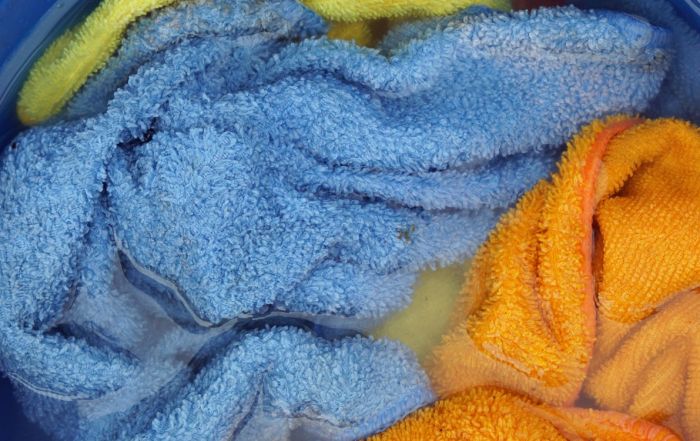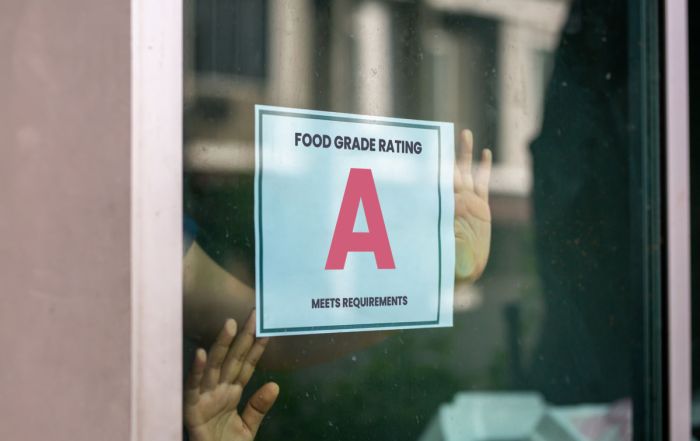The Worst Customer Complaint: Foodborne Illness
 Food service managers and crew try to follow the rules of food protection. Yet, occasionally a complaint may arise and these calls take priority over all other daily crises. If you have been in the food service industry long enough, you may have gotten one of these. A customer may claim, “I think your food made me ill.” These words inflict instant anxiety. If it happens, here are some next steps to think about in advance of such a claim:
Food service managers and crew try to follow the rules of food protection. Yet, occasionally a complaint may arise and these calls take priority over all other daily crises. If you have been in the food service industry long enough, you may have gotten one of these. A customer may claim, “I think your food made me ill.” These words inflict instant anxiety. If it happens, here are some next steps to think about in advance of such a claim:
First, have a crisis plan in place that includes what to do if a foodborne illness (FBI) call comes in, as part of your overall crises plan. Plan the initial response in advance of such a call. The manager is not always on site, so decide who is next to take that call. It should be a member of management—not your newest employee. Keep in mind one of the best allies may be your health department. In your favor, they may be able to quickly disprove that the complaint was from your food. In the worst case, if more than one call comes in from a second unrelated customer, take the high road and contact the health department first before they contact you. The crisis plan should include who to contact in your chain of command including supervisors, insurance, medical, and legal advice if necessary.
For a reality check, take a look at the legal side of foodborne disease. Go to the Marler & Clark website which is a well-known law firm to the food industry and it explains terms such as “strict liability” and gives its advice on how to avoid foodborne lawsuits.
Is it really from your food? Realize there are a number of possible scenarios here. One is that the customer is indeed suffering an illness, and that it is unrelated to the food you have served. Another is that the customer has a personal reaction to a particular food — an intolerance or even an allergy. Of course, it could be a foodborne illness caused by pathogens, too. The source could be from the customer’s home kitchen, your operational practices, or from serious contamination introduced into the food before it even reached your operation. So, how do you begin to sort it out?
Interviewing a customer that says they or a family member was ill from your food is not an easy task and you may need some professional assistance from a food safety pro. Chain restaurants typically employ specialists in place to handle such calls, but your facility may not. The customer is already impatient and they may be quick to self-diagnose what has happened with little actual food safety knowledge, so have a questionnaire in place to cover the basics.
Basic FBI Interview – The first priority is to gather some information. Your approach must be systematic and objective. Make notes about all the information you obtain. Here are some examples of questions to ask the customer:
- Who is calling and what is their contact information? What was the meal in question? When was it consumed at the restaurant?
- What symptoms do you have?
- When exactly did the symptoms begin? The first symptom is very important in an investigation.
- Have you consulted a physician about these? If so, whom?
- What foods have you consumed over the past few days, and where were they obtained/eaten? This might be tough to get, but the health department will try to get a 3-day history of what the person ate.
- (If take-home food): Was the food held in the refrigerator? Was it reheated (and under what conditions)? Were there any leftovers? (If the customer has the food at home, they should retain the food so it can be tested.)
Often, the suspect food is no longer remaining at the restaurant, but if it is, don’t discard it. Segregate it, mark it, and keep it refrigerated. It might be helpful in indicating that your facility was not the source of the illness. Public health officials evaluating foodborne illness outbreaks look for the food that complainants have in common, and this is not always easy to sort out. In fact, most people have trouble identifying the food that might have caused illness. It’s NOT always the last meal the person ate. Foodborne illness symptoms may take many hours, or days, to develop. Keep food safety temperature and HACCP (hazard analysis/critical control point) records up to date. They may be your best defense.
Some Suggested Do’s & Don’ts – As important as the questions to ask is the list of things you should NOT say to a person who suspects your food has caused an illness.
- DO NOT try to make a diagnosis of the illness. DO leave the diagnosis to a physician.
- DO NOT suggest symptoms. For example, if a customer says he has stomach pain, you should NOT ask, “Do you have diarrhea? Do you have a fever?” Instead, DO listen attentively and allow the customer to talk.
- DO NOT suggest a remedy. You should not tell the customer how to treat the symptoms. DO suggest the customer seek medical attention.
- DO NOT claim responsibility if the cause has not been verified. So, you would not say, “Oh, I’m so sorry our food made you sick.” DO say something like, “I’m sorry to hear you are not feeling well. We will investigate these concerns.”
- DO NOT argue with a customer or dismiss a complaint. For example, if a customer presents a complaint, do not simply say, “Oh, there’s no way our food could have made you sick.” DO listen and withhold judgment. Tell the customer you will investigate the concern.
Get Help – As mentioned already, the best advice is generally to notify your local public health official about the complaint. While you may feel this is uncomfortable, it is sound management. There are several reasons. First of all, a public health official has the knowledge and experience to sort through the facts. Furthermore, the official has the resources to perform any required testing to confirm or disprove an allegation. If others are or may be afflicted, the official can gather information from many sources—and protect the health of others.
Your Reputation – Whether the complaint that arises turns out to be real or just passing confusion, one fact holds true: Your public image is at stake. News media may become involved. So, it is critical to have a policy in place for interacting with the media, and with the public at large. You should have a designated media spokesperson for your organization. Refer inquiries to that spokesperson.
Develop that crisis plan! As with any crisis, pre-established plans and assigned roles make management flow more smoothly. You need to communicate policies and procedures in advance to your staff. If a customer walks up to a cafeteria server and relates a concern, that server should make an immediate referral to the appropriate person — you or a supervisor you designate.
Bottom Line: A case or outbreak of foodborne illness can be very expensive —in dollars, in reputation, and in human health. The best approach to food safety is still prevention. But if a concern arises, sound management dictates you take it seriously, research it objectively, and call in appropriate professionals for help.
***
About the Author: Lacie Thrall

This information is provided as a general guideline and is not intended to be, nor does it, constitute legal or regulatory advice. Additional Federal regulations may apply to your particular circumstances. State, regional and local laws, ordinances and regulations may also apply.
READ MORE POSTS
Embracing Technology for Enhanced Food Safety in Foodservice Operations
Technology. We love it, we hate it. I’ve always been fascinated by technology; I remember getting my first Blackberry in the mid-90s and thinking it was the pinnacle of technological advances. Before that, I remember ordering a dictation program in college that was going to revolutionize the way I “typed” my assignments. Looking back, it really wasn’t worth the box that the program came in. Now, we have ChatGPT that will write the entire paper for us!
Meat Color and Doneness: Persistent Pinking
Late in June, my family and I were able to visit the Black Hills, an area of the country in which I have not had the opportunity to spend much time. One evening, as we dined at a local restaurant, I observed a table across the dining room sending back a dinner. While I couldn’t hear the entire conversation and I certainly wasn’t trying to eavesdrop, it was apparent that the customer was unhappy with the cooking of their hamburger and was sending it back because it was too pink in the middle. That immediately brought to my mind the phenomenon known as persistent pinking. A term I became familiar with because of work done by some colleagues here at Kansas State, which they present each summer to a group of foodservice operators who join us on-campus for an in-depth week-long look at all things food safety.
Quat Binding – Why this Can Have a Disastrous Impact on Your Sanitation Program.
In June, I had the opportunity to represent FoodHandler and speak on food safety behavior for customers of Martin Bros. Distributing in Waterloo, Iowa. One of the questions that was asked caught me a little off guard. The question was about quat binding. It caught me off guard not because it was a bad question, but only because it was not something I had previously been asked nor had not yet been exposed to the phenomenon. However, I soon learned that in certain jurisdictions, it is resulting in changes to how sanitizing cloths are to be stored in sanitizing buckets (or not) in the foodservice industry. When I returned home from the trip, I had to dig into it to learn about what quat binding is and how it might impact foodservice operations.
Are Grades for Foodservice Inspections a Good Idea?
I generally try to stay away from controversial topics in my blog, but this is one I thought it might be interesting to discuss. Occasionally on my travels, I will come across a state or a local jurisdiction that requires foodservice inspection scores be posted in the window of the establishment. The idea is to allow would-be customers the ability to see how the foodservice operation in which they are about to eat scored on their latest health inspection.










